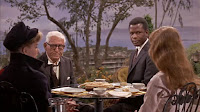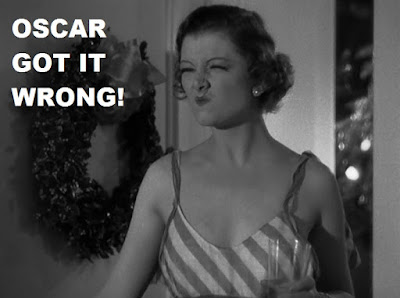Arthur Penn: Bonnie and Clyde
Mike Nichols: The Graduate (winner)
Stanley Kramer: Guess Who’s Coming to Dinner
Richard Brooks: In Cold Blood
Norman Jewison: In the Heat of the Night
What’s Missing
There are a lot of opportunities to fix problems with the nominations for Best Director in 1967. It’s a great year for foreign films, particularly from France. Not from France but still worth mentioning is Miklos Jancso and The Red and the White. The same is true of Milos Forman and The Fireman’s Ball. This is also the year John-Pierre Melville made Le Samourai, which certainly deserves some consideration. Jacques Demy made The Young Girls of Rochefort and Luis Bunuel made Belle de Jour. It’s also the year for Jacques Tati’s most elaborate and technically brilliant film, Playtime. Jean-Luc Godard made not one but two interesting films in 1967 in 2 or 3 Things I Know About Her and Weekend. Mel Brooks won an Oscar this year for the screenplay of The Producers, so a director nod doesn’t seem crazy. It’s also the year Terence Young made Wait Until Dark. The person I’d most like to see here, though, is John Boorman for Point Blank.
Weeding through the Nominees
5. Guess Who’s Coming to Dinner is not in any respect my least favorite film that was nominated, but I have to wonder what Stanley Kramer did here beyond film a movie that turned out to be somewhat controversial. The truth is that I like the story here—I like that were given a situation where people who proclaim to be not racist are confronted with the latent racism they still experience. But this is a case where the screenplay and the performances are good, but the director focused his camera in the right place. That doesn’t deserve a nomination.
4. In Cold Blood is a film that I think is interestingly directed. There is a sense in the film that it’s almost a documentary—a very dark and twisted documentary, but a documentary nonetheless. It’s also a deeply unpleasant movie, and while that’s entirely appropriate, it’s also something that makes the film very hard to like and recommend. It’s probably unfortunate that that ends up counting against Richard Brooks, but it’s a fact about the movie that is hard to forgive. This process isn’t always fair.
3. I like In the Heat of the Night as a story. One of the things I like about it is that it’s a very, very smart movie. It’s easy to forget just how smart it is, but it’s smart enough that it makes Virgil Tibbs have his own racism issues, which drives the movie through the second and into the third act. I also happen to like Norman Jewison in general. I’m a fan of pretty much all of the Jewison films I’ve seen. So I like this nomination, but as much as I do, I can’t really push Jewison above third place.
2. There’s a lot I don’t like about The Graduate. I don’t like the story and I don’t like the characters. But I do really like the fact that Mike Nichols tapped into something very real. For as much as I don’t like Benjamin Braddock as a person, I recognize that just about everyone, myself included, is Benjamin Braddock for a year or so (at least). So, while there’s a great deal here that I dislike, there’s a great deal that I at least respect. Additionally, that last shot (even though it was allegedly a mistake) is absolutely genius, and that alone is worth the nomination.
My Choice
1. The Academy is always a certain number of years behind the times, and while it’s a little surprising that Arthur Penn actually got a nomination. Once he did, though, it’s absolutely not a surprise that he didn’t win. Bonnie and Clyde changed the way movies could be made. It changed what could and would be shown on the screen. It was a shock and a revelation, and because of that, the Academy simply wasn’t ready for it. True innovators are almost always ignored in the moment, and in this case, Penn fell victim to the Academy’s inability to see where the industry was going.
Final Analysis








I like The Graduate but part of me thinks the film is overrated. Arthur Penn would've been the more ideal choice but I would've put more consideration towards Jacques Tati for Playtime, Jean-Pierre Melville for Le Samourai, Robert Bresson for Mouchette, Masaki Kobayashi for Samurai Rebellion, and Frantisek Vlacil for Marketa Lazarova. Those were groundbreaking films.
ReplyDeleteI really dislike the characters in The Graduate, and that's going to make the movie a hard sell for me. Still, I can't fault Nichols's work on it.
DeleteI should get around to Samurai Rebellion.
It is true this was a great year for international film. I could easily see Melville and Forman nominated.
ReplyDeleteI agree on your arguments for Bonnie and Clyde, but you can say much of the same for The Graduate and In the Heat of the Night. I may be more inclined to pick In the Heat of the Night, not just because I like it better, but as you write, it is a very smart film and a lot of that comes from the direction, though the screenplay would have to get a lot of that credit too.
I think a lot of the smarts in In the Heat of the Night is there in the script. Jewison was smart enough to keep it in.
DeleteI'm with you on Penn for Bonnie and Clyde though I can't say I'm surprised he didn't win.
ReplyDeleteWhen it was initially released Warner Bros. and especially Jack Warner didn't believe in the film and dumped it in some small theatres in Kansas and Oklahoma prepared to write it off as a loss. Beatty took control of it as a producer and stomped for the picture relentlessly building it into the success it became. Once it started making money of course the studio gave it the big push but the old guard still held it in disdain.
The Graduate was also cutting edge at the time but at root it's angsty story of alienation and familial conflict was more palatable to the main Academy body than the ultra violence of B&C.
Right--it was perhaps a litle too early. If it had come out in 1969 with Midnight Cowboy it might have given Penn a better chance of winning.
DeleteIt's clearly the violence, particularly the end of the film, that turned off the Oscar voters. Honestly, I'm a little surprised it got nominated.
What a great year for directors! (Except Kramer.) Certainly can't agree with your choice but, on balance, I think Oscar got it right. In an open field I'd have an agonizing time deciding between Melville and Kobayshi.
ReplyDeleteKramer was a fine director. I just don't really know what he did here.
Delete